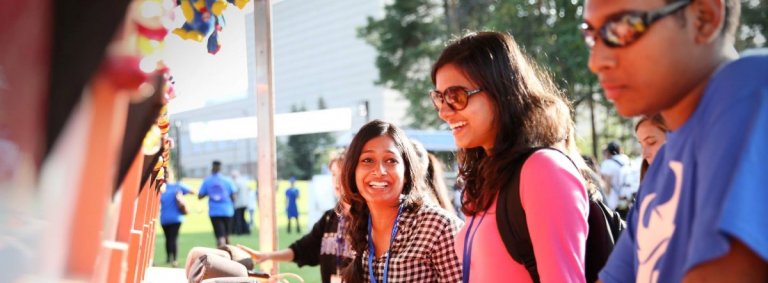
International education today is no longer what it was 15 years ago.
Where once these students wanted only to go to the US, now the options are so much wider: China, Canada, Finland, Germany and Australia are increasingly competing to attract the best and brightest from students worldwide.
This is the reality that’s hitting the University at Buffalo located in the US state of New York, according to student newspaper The Spectrum. This year, the school saw declining international enrollment.
“Fifteen years ago, the US was the only global place for education. But now, you can find countries with better scholarship programs who are trying to make their admissions more accessible to international students, because they do want to compete with the United States,” said Celaster Denisraj, an industrial engineering graduate student.
“It’s not just the US anymore at the top.”
Trump’s impact on the American brand, perceptions over school shooting risks, and increased competition from countries like Germany, Canada and Australia to explain decline in new international enrollment at UB and across the U.S. https://t.co/RW3S61QOXZ pic.twitter.com/dIEros41LU
— The Spectrum (@UBSpectrum) March 1, 2018
More options represent only one facet of this new reality. Other issues come into play as well, such as the US’ mass shooting problem and rising tuition fees.
Though Stephen Dunnett, UB’s vice provost for international education, maintains the school is optimistic about its ability to recruit despite the increasing competition, he admits the perceived risk of gun violence is an issue.
“However, in our marketing, messaging and conversations with international students, UB actively seeks to inform prospective and current students about how welcoming and safe UB and our surrounding communities are,” Dunnett said in an email to UBSpectrum.
“Also, many members of the university faculty are very involved, through their research and scholarship, in responding to issues of school violence and gun laws.”
However, when considering where to study, issues like the ease of getting a job after graduating as well as work visas usually trump gun violence in the minds of international students.
“There is always going to be a focus on [violence] in America. America is such a big country, with such a strong economy, everyone always is going to want to find its flaws, and they’re going to focus on what’s going wrong,” Denisraj said.
“They don’t focus on that in India because something goes wrong every day. But when you think of America, despite all the hundreds of good things that are happening here, there’s a psychological tendency to focus on what’s going wrong.”
The US still receives the highest number of international students, though in recent years (even before Trump) numbers have been on the decline, data from the Institute of International Education show.
What’s happening in UB reflects national trends. Multi-dimensional factors affect the enrollment rates in each university – UB is no different.

Google appointing a 2nd-generation immigrant as CEO gave a “welcoming” feeling to prospective international students from India. Source: Wikimedia Commons
But as experts have argued, a welcoming outlook always plays a big part in how international students choose a particular country to study in or how satisfying they feel once they are in their new host country.
Feeling “welcomed” also comes in many forms. For example, Google’s appointment of a second-generation immigrant Sundar Pichai as its CEO in 2015 gave Indians a “positive feeling” that the US is very accepting and welcoming of immigrants, according to Mithil Kadam, an industrial engineering student.
“It’s just a psychological thing, but it can be very powerful. And obviously, like with Trump, a negative psychological impact is always more powerful than a positive one.”
Liked this? Then you’ll love these…
How family plays an important role for international students
Weak currency makes international study more expensive for Nigerians







